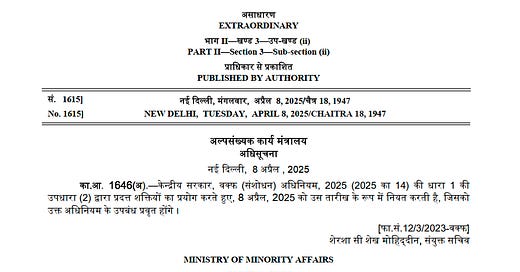Of Vague Laws and Oral Assurances: Notes from Day 1 of the Waqf Amendment Hearing
Vagueness in our laws are not some innocent instances of lapse in drafting; instead, laws are loosely drafted on purpose so that the Executive, as and when required, can bend those to its will.
By now, it should be clear to all observers of constitutional litigation in India that vagueness in our parliamentary laws, esp. the ones enacted post 2019, is not by accident but by design. This once again became apparent on day 1 of the Waqf hearing when the Bench had to point out to the Solicitor General that his stand cannot be ‘contrary to the language of the statute’, and that his arguments ‘militate against the statute’. While the Solicitor did offer to file an affidavit, averments made on an affidavit do not change the text of a duly passed legislation.
This open-endedness is not peculiar to the Waqf Amendment of 2025, but, as I have argued here, runs across a number of recently passed laws. Interestingly, in all such cases, there are instances of the Government taking a stand not in sync with the bare text of the law. When the Criminal Procedure (Identification) Act of 2022 was being debated in the Parliament, the then Home Minister orally ‘assured’ the House that the law would not be used to target political dissidents. However, when the rules came out, no such exception could be seen.
Once again, in the Waqf Amendment challenge today, the Solicitor kept submitting propositions which were simply not present in the law:
1. The Solicitor conceded that the second Proviso inserted in Section 2 of the 1995 Act was superfluously worded and did not have much meaning;
2. He then said that registered Waqf by user would continue to be valid, even when as a clear consequence of the new amendment, antiquated Waqfs existing basis practice and without any deed will eventually lose recognition;
3. Responding to comments from the Bench regarding the unfair nature of Proviso to Section 3C (2), the Solicitor made a strange submission that while no property shall be treated as a Waqf property pending dispute, its usage as Waqf property won’t stop;
4. The Solicitor also submitted that the Council shall at most have 2 non-Muslim members + 2 ex-officio members who may be of other faith, when the bare text of the provision puts Muslims in the minority. The Bench correctly pointed out that if this was the case, there was no need for the new Section 9(2) (c) to specifically use the phrase ‘from amongst Muslims’.
The final interim view of the Court is yet to be seen. What once again became clear from the hearings on day 1, however, is that vagueness in our recently passed laws are not some innocent instances of lapse in drafting; instead, laws are loosely drafted on purpose so that the Executive, as and when required, can bend those to its will. Courts must not stop at recording oral submissions of Government pleaders to water down loose provisions; instead, such provisions should either be invalidated or actively read down in judgments to meet the requirements of fairness, reasonableness and proportionality.




